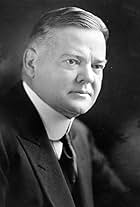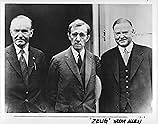Herbert Hoover(1874-1964)
- Additional Crew
Herbert Hoover was born on August 10, 1874 in West Branch, Iowa. His
family were devout Quakers. At age eight, Hoover was orphaned and was
sent to live with relatives. They showed him little affection, but
taught him the importance of hard work and industry. In 1891, Hoover
entered Stanford University's School of Engineering, graduating in
1895. Four years later, he married his wife, Lou Henry and they had two
sons, Herbert Jr. and Allan. From an early age, Hoover showed a
prodigious talent for engineering and was hired by the engineering firm
Bewick and Moering, working in Australia and then in China. He was in
China when the Boxer Rebellion of 1900 broke out and he coordinated the
barricades of Americans trapped in China. At age forty, his engineering
career was so successful that he was a millionaire. 1914 saw the
outbreak of World War I in Europe. That was when he left his
engineering career and entered public service. He organized a relief
effort to feed starving Belgians, known as the Commission for the
Relief of Belgium. When the U.S. entered the war in 1917, President
Woodrow Wilson asked Hoover to organize the Food Administration, which
encouraged Americans to cut down on food consumption to help the war
effort. After the end of World War I in 1918, Hoover organized a
massive relief effort to feed starving peoples in Europe, whose
countries had been devastated by the war. From 1921 to 1929, Herbert
Hoover served as Secretary of Commerce, under Presidents Harding and
Coolidge, expanding the department and making it more active in working
with business and labor. In 1928, he was the Republican candidate for
President and easily defeated his opponent, the Democratic Candidate,
Alfred E. Smith. Herbert Hoover was sworn in as President on March 4,
1929. Seven months after he entered office, the Stock Market crashed,
ending the "Roaring Twenties" and the economic boom of that decade and
ushered in the Great Depression. At first, Hoover was proactive in
handling this economic crisis, having meetings with business leaders on
how to weather the economic downturn, cutting taxes and increasing
money for corporations and state governments. But none of this was
effective in the teeth of the worst economic crisis in American
history. He tried to calm the situation with statements like
"Prosperity is just around the corner," but they were not effective.
His dour demeanor and seemingly callous attitudes towards the millions
of unemployed were what people saw in him, particularly when he refused
to provide direct relief to the unemployed. Things came to a head in
the summer of 1932 when the Bonus Expeditionary Force (BEF), an army of
World War I veterans, marched to Washington demanding immediate payment
of a bonus promised to them in 1945. But the veterans wanted their
money now. They camped out along the Anacostia River and lobbied for
their bonus. The House of Representatives approved immediate payment,
but the Senate voted no. Hoover obtained $100,000 from Congress to buy
the veterans train tickets home. Many veterans accepted the offer, but
many stayed in Washington. At that point, the US army led by Gen.
Douglas McArthur forcibly evicted the veterans from Washington, setting
their camps on fire and forcing them out at gunpoint. In so doing,
McArthur disobeyed Presidential orders, but Hoover took full
responsibility for the eviction of the Bonus Marchers. In the 1932
election, Herbert Hoover was defeated in a landslide by Democrat
Franklin D. Roosevelt. After he left office in 1933, Hoover returned to
California and was an unstinting critic of FDR. After the death of his
wife in 1944, Hoover moved to New York City where he lived his last
twenty years at the Waldorf Towers, remaining active in Republican
Party politics. In 1946, President Harry Truman asked him to undertake
yet another relief effort for the people of Europe; he and Truman
became surprisingly good friends. In 1953, Hoover chaired a commission
to increase efficiency in the Executive Branch of the Federal
Government. He died on October 20, 1964 at age ninety.




